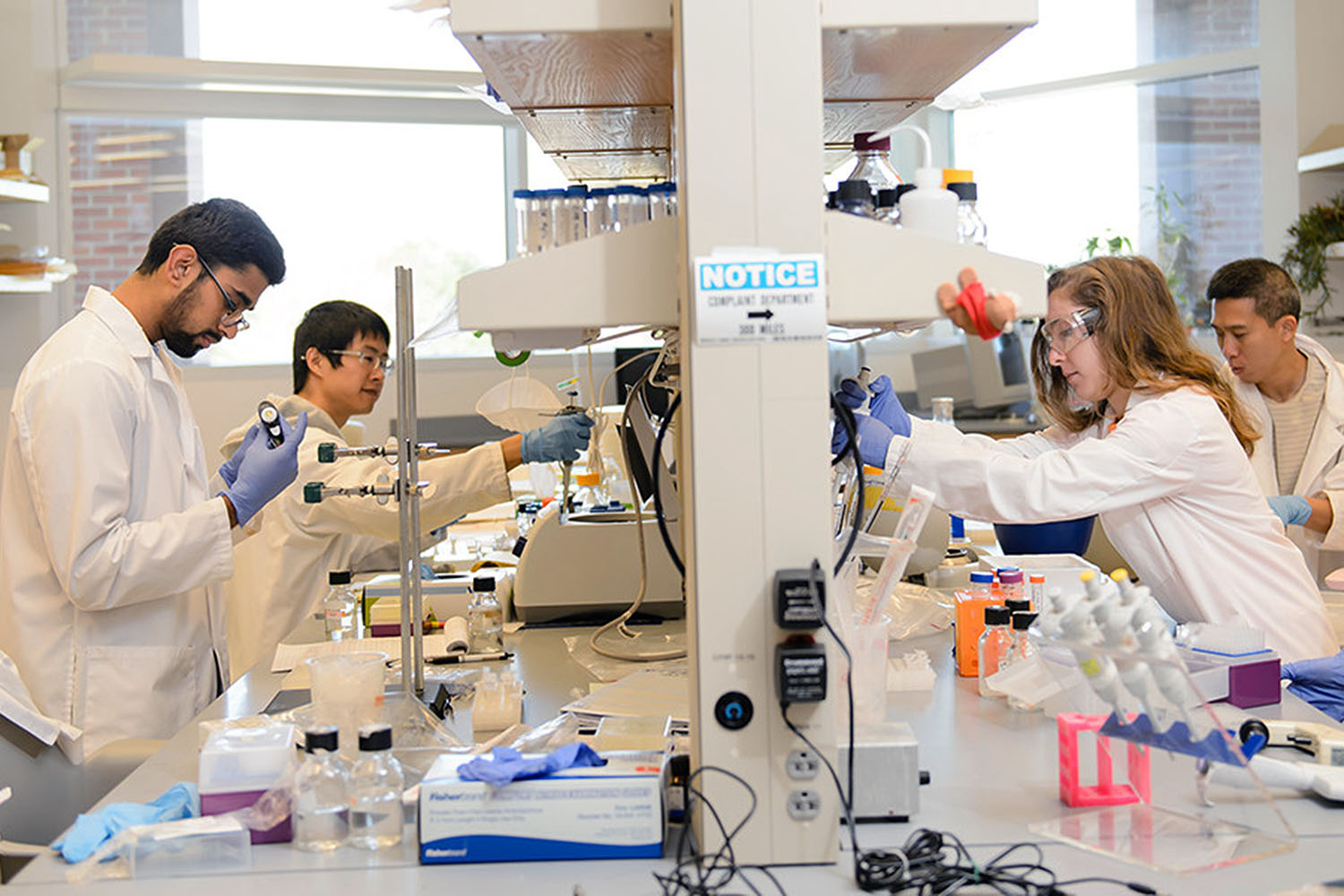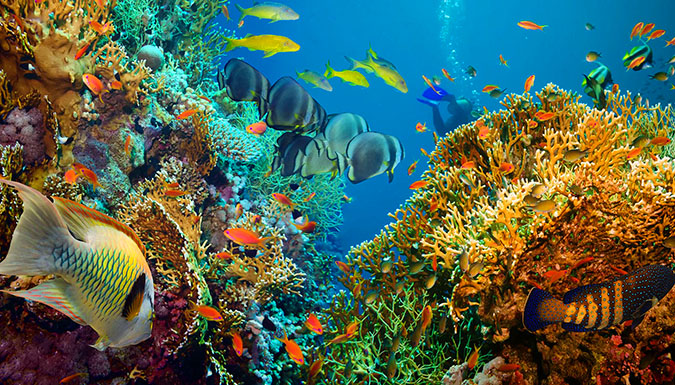Undergraduate Program Overview

As an undergraduate student in the Department of Biological Sciences, you will undertake a rigorous curriculum that emphasizes the importance and use of communication, modern information technology and mathematics.These skills and tools are cultivated through all four years at Clemson and are evaluated in a senior-year seminar course.
Focused On Discovery
Your time here will be focused on exploring themes of discovery, from cells to ecosystems, as well as the application of biology to broader fields, including medicine, agriculture and conservation.
A variety of focus areas allow students to tailor their coursework to prepare for future careers in medicine, conservation, ecology, dentistry, pharmacy, rehabilitation sciences, nursing, toxicology, microbiology, molecular biology and computational biology. Students are encouraged to participate in biological research both inside and outside of the University, as the process creates both career and personal benefits. Each student is also encouraged to undertake research projects with faculty, and series of creative inquiry team research projects are offered each semester.
One Department, Many Options
Undergraduates in the Department of Biological Sciences may pursue a degree in either biological sciences or microbiology. A degree in biological sciences is as diverse as life itself. With a major in biological sciences you’ll take on course work that will help you understand the breadth of biology, but you’ll have flexibility to tailor the program to your specific interests. With a major in microbiology you’ll describe and characterize organisms in structure, function and processes of reproduction, growth and death at cellular and molecular levels.
Biological Sciences
You may be interested in studying at the cellular level, or you may be interested in looking at mammals as large as elephants. You may want a better understanding of human biology, or you may be more interested in plants. The beauty of the biological sciences major is its flexibility: Begin with the basic sciences and later take classes that will tailor your degree to your interests.
The Clemson University Department of Biological Sciences provides two undergraduate degree programs: a Bachelor of Arts degree in biological sciences as well as a Bachelor of Science degree in biological sciences. The difference between the two degrees is that the B.A. requires four modern language courses and a minor.
The Bachelor of Arts degree provides a strong foundation in biology and is ideal for students desiring a liberal arts education emphasizing an interdisciplinary approach to a thorough understanding of the life sciences. Example careers include the fields of health care, law, policy or secondary science teaching. The Bachelor of Science degree is a more comprehensive science degree and is preferred for those who wish to pursue scientific careers, enter professional school or continue into graduate programs requiring a strong science foundation. It offers the opportunity to explore areas of biology and delve deeper into biological questions of interest. A variety of focus areas allow students to compete coursework relevant to their career interests.
Microbiology
Influenza! Plague! Ebola! Anthrax! You've seen them in the movies and on TV — microbes are everywhere. But did you also know that microbes helped in the Gulf oil spill? That one day your car may run on gas produced by microbes? That fungi produces antibiotics that may one day save your life?
The Clemson University Department of Biological Sciences offers a Bachelor of Science degree in microbiology. Microbiologists seek to describe and characterize organisms in structure, function and processes of reproduction, growth and death at cellular and molecular levels. They are also interested in the ecology of microbes and the interaction with higher-level organisms.
Microbiology majors take a closer look at all these issues and more. Are you interested in infectious disease? At Clemson, you can pursue a general microbiology degree or you can choose to do a major concentration in biomedicine if you plan to pursue a career in the medical field.
If you choose to follow the general microbiology curriculum, you'll take one class in each of these three areas — biomedicine, environmental, and food and industrial microbiology. Additionally, undergraduate research opportunities are available in medicine, biofuels, bioremediation and more.
Student Resources
Quick Links
The College of Science is home to a multitude of programs to assist first-year and continuing students in their coursework and life outside the classroom at Clemson. The department also hosts a number of clubs and organizations that enhance your resume and connect you with like-minded individuals.
-
Student Handbooks
Recent student handbooks can be found here (as downloadable/viewable PDFs). For older handbooks, contact the department directly.
-
Honors College
Clemson University Honors College students are challenged to excel through specialized courses with Clemson’s best professors; a wide range of innovative learning experiences on campus, across America, and around the world; and intellectual engagement via formal and informal interactions with other Clemson students, staff and faculty. We encourage our students to create their own ideal education, by sponsoring programs such as study abroad and undergraduate research, and by providing individualized funding for internships, educational travel, and professional development. Whether you’re a prospective student or already enrolled, the Clemson University Honors College is here for you.
-
COSMIC
COSMIC is the College of Science Mentoring and Inclusion Collaborative. It is an award-winning peer mentoring program intended to support incoming students with their transition to Clemson by matching them with upperclassmen mentors who come from similar backgrounds and share similar interests.
Affinity groups in the COSMIC Ecosystem include women, men, military and veteran students; first-generation students; transfer students; students with disabilities; students of color; and LGBTQIA+ students. COSMIC also offers faculty and staff liaisons who provide academic support to mentors and mentees. This is truly an inclusive program at Clemson University, providing cross-cultural collaboration and engagement.
To find those upperclassmen, incoming students will complete a COSMIC mentee application that shares their experiences and interests. The applications will then be matched with mentors based on the above-mentioned criteria. Mentors will help their mentees navigate college life by checking in, setting goals, answering questions and providing support. Any student admitted to the university as a College of Science major is eligible to apply. Acceptance into the program, however, is on a first-come, first-served basis.
-
RISE: Residents In Science and Engineering
Residents In Science and Engineering living-learning community is a first-year transition program in conjunction with being a unique living-learning experience. Clemson RISE provides opportunities for first-year STEM students to write their own Clemson stories. The mission of the RISE is to assist students in their transition to college by combining the academic and residential experiences in order to foster academic success and facilitate professional development.
Diverse Career Options
The programs in the Department of Biological Sciences are designed to expose students to a wide variety of biological areas and research. The background obtained by biological sciences and microbiology majors enables students to better understand and relate to the modern world with its complex problems, many of which are biological in nature.
-
Academia and Government Careers
Job opportunities exist in both the academic and nonacademic communities. For students who continue on to graduate school, teaching jobs are available in colleges and universities. There are also research and management opportunities in government and industry. Many biologists and microbiologists are employed by industry, environmental engineers and consulting firms. City, state and federal agencies are also prime employers of biologists and microbiologists. And in the spirit of discovery, career opportunities in biology are exciting and often adventurous.
Jobs with universities, state and federal government agencies, the military, and private businesses often include a chance to travel and explore exotic or remote regions of the world. Many professors in the department offer research trips that include field work in India, Florida, Panama, Costa Rica and Dominica.
In the Southeast, jobs are available at agencies such as the Energy Research and Development Administration’s Savannah River Ecology Lab in Aiken, South Carolina; the Oak Ridge National Laboratory; the Tennessee Valley Authority in Tennessee and North Carolina; the Department of Agriculture; the Centers for Disease Control Center in Atlanta; the Environmental Protection Agency; Yerkes Primate Center in Atlanta; the Bureau of Sport Fisheries and Wildlife; and many zoos and zoological parks.
-
Health Care Careers
Doctors, physician assistants, pharmacists, physical therapists and veterinarians are biologists. Some of the health care professionals work directly with patients, while others are involved in the rapidly advancing frontiers of medical research. In both cases, a degree in biological sciences or microbiology is excellent preparation for professional school in the health sciences. In fact, biological sciences is the most popular major at Clemson University for students with an interest in human medicine and health care, and is one of two common majors chosen by students wishing to apply to a school of veterinarian medicine. Students wishing to learn more or take a three-year path to medical school should explore Health Professions Advising, which offers assistance for students wishing to continue their education in medicine, health care, pharmacy or physical therapy.
-
If You Continue to Grad School…
In addition to job opportunities immediately upon graduation, biological sciences and microbiology degrees prepare students for admission into a wide variety of graduate programs in biology, botany, microbiology and zoology. With a careful selection of courses in allied fields or an emphasis area, students can prepare for more specialized programs in areas such as environmental toxicology, bioengineering, environmental sciences, animal sciences, physiology, ecology, zoology (including ornithology, mammology, parasitology and herpetology), biophysics, biomathematics, agronomy, plant pathology, entomology, biochemistry, genetics, pharmacology, ecology, horticulture, molecular biology, cell biology, evolution, marine biology, aquaculture, wildlife biology and more. Faculty advisers can suggest courses relevant to particular interests and objectives.
-
Additional Resources
Job options are boundless in the sciences. The following links are useful tools when considering your future:
READY TO TAKE THE NEXT STEP?
Apply to the Department of Biological Sciences

Creative Inquiry
Learning Programs Communicate Importance of Healthy Oceans
At Clemson, research, teaching and outreach efforts help students play a critical role in ocean health through Creative Inquiry undergraduate learning opportunities. As part of the program, students have the opportunity to explore the impacts of climate change on aquatic invertebrates and reef fishes or focus on teaching climate and ocean literacy principles to elementary school students.
Read the Full Story